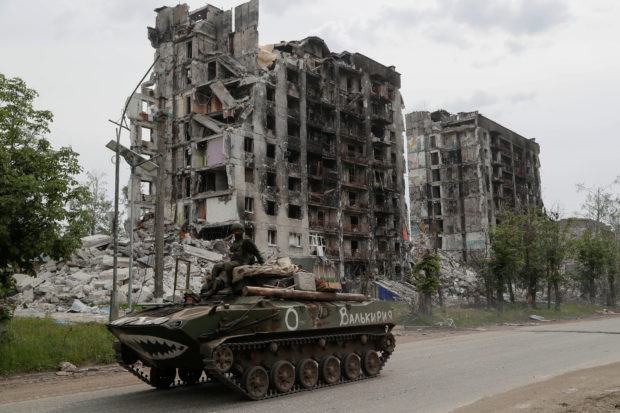Ukraine says troops may retreat from eastern region as Russia advances

Service members of pro-Russian troops drive an armoured vehicle along a street past a destroyed residential building during Ukraine-Russia conflict in the town of Popasna in the Luhansk Region, Ukraine May 26, 2022. The writing on the vehicle reads: “Valkyrie”. (REUTERS)
KYIV/POPASNA, Ukraine – Ukraine said on Friday its forces may need to retreat from their last pocket of resistance in Luhansk to avoid being captured by Russian troops pressing a rapid advance in the east that has shifted the momentum of the three-month-old war.
A withdrawal could bring Russian President Vladimir Putin closer to his goal of capturing Ukraine’s Luhansk and Donetsk regions in full. His troops have gained ground in the two areas collectively known as the Donbas while blasting some towns to wastelands.
Luhansk’s governor, Serhiy Gaidai, said Russian troops had entered Sievierodonetsk, the largest Donbas city still held by Ukraine, after trying to trap Ukrainian forces there for days. Gaidai said 90% of buildings in the town were damaged.
“The Russians will not be able to capture Luhansk region in the coming days as analysts have predicted,” Gaidai said on Telegram, referring to Sievierodonetsk and its twin city Lysychansk across the Siverskiy Donets River.
“We will have enough strength and resources to defend ourselves. However it is possible that in order not to be surrounded we will have to retreat.”
Article continues after this advertisementMoscow’s separatist proxies said they now controlled Lyman, a railway hub west of Sievierodonetsk. Ukraine said Russia had captured most of Lyman but that its forces were blocking an advance to Sloviansk, a city a half-hour drive further southwest.
Article continues after this advertisementUkrainian presidential adviser Oleskiy Arestovych said overnight that the well-organised attack on Lyman showed Moscow’s military, which was driven back from the capital Kyiv in March, was improving its tactics and operations.
‘AT GREAT COST’
British Prime Minister Boris Johnson told Bloomberg UK that Putin “at great cost to himself and to the Russian military, is continuing to chew through ground in Donbas”.
Russian troops advanced after piercing Ukrainian lines last week in the city of Popasna, south of Sievierodonetsk. Russian ground forces have now captured several villages northwest of Popasna, Britain’s Defence Ministry said.
Reached by Reuters journalists in Russian-held territory on Thursday, Popasna was in ruins. The bloated body of a dead man in combat uniform could be seen lying in a courtyard.
Natalia Kovalenko had left the cellar where she sheltered to live in the wreckage of her flat, its windows and balcony blasted away. She said a shell hit the courtyard outside, killing two people and wounding eight.
“I just have to fix the window somehow. The wind is still bad,” she said. “We are tired of being so scared.”
Russia’s eastern gains follow a Ukrainian counter-offensive that pushed Moscow’s forces back from Ukraine’s second city Kharkiv in May. But Ukrainian forces have been unable to attack Russian supply lines to the Donbas.
Russian forces shelled parts of Kharkiv on Thursday for the first time in days. Local authorities said nine people were killed. The Kremlin denies targeting civilians.
In the south, where Moscow has seized a swathe of territory since the Feb. 24 invasion, including the strategic port of Mariupol, Ukrainian officials believe Russia aims to impose permanent rule.
Ukraine’s military said Russia was shipping in military equipment from Russian-annexed Crimea to build defences against any Ukrainian counter-attack and was mining the banks of a reservoir behind a dam on the Dnipro River that separates the forces.
STRUGGLING TO LEAVE
In the Kherson region, north of Crimea, Russian forces were fortifying defences and shelling Ukraine-controlled areas on a daily basis, the region’s Ukrainian governor Hennadiy Laguta told a media briefing.
He said the humanitarian situation was critical in some areas and people were finding it almost impossible to leave occupied territory, with the exception of a 200-car convoy that left on Wednesday.
On the diplomatic front, European Union officials said a deal might be reached by Sunday to ban deliveries of Russian oil by sea, accounting for about 75% of the bloc’s supply, but not by pipeline, a compromise to win over Hungary and unblock new sanctions.
Ukrainian President Volodymyr Zelenskiy has criticised the EU for dithering over a ban on Russian energy, saying the bloc was funding Moscow’s war effort and that delay “merely means more Ukrainians being killed.”
In a telephone call with Austrian Chancellor Karl Nehammer, Putin stuck to his line that a global food crisis caused by the conflict can be resolved only if the West lifts sanctions.
Nehammer, who visited Russia in April, said Putin expressed readiness to discuss a prisoner swap with Ukraine but he said: “If he is really ready to negotiate is a complex question.”
Russia’s blockade of Ukrainian ports has halted shipments of grain, driving up global prices, with both countries major grain exporters. Russia accuses Ukraine of mining the ports and Ukraine has described the Russian position as “blackmail”.
Russia, which calls its invasion a “special military operation”, launched its assault in part to ensure Ukraine does not join the U.S.-led NATO military alliance.
But the war has pushed Sweden and Finland, who were both neutral throughout the Cold War, to apply to join NATO in one of the most significant changes in European security in decades.
The Nordic states’ bids have been tripped up over opposition by NATO member Turkey, which contends they harbour people linked to a militant group it deems a terrorist organisation. Swedish and Finnish diplomats met in Turkey on Wednesday to try to bridge their differences.
“It is not an easy process,” a senior Turkish official told Reuters on Friday, adding that Sweden and Finland must take “difficult” steps to win Ankara’s support. “Further negotiations will continue. But a date doesn’t seem very close.”